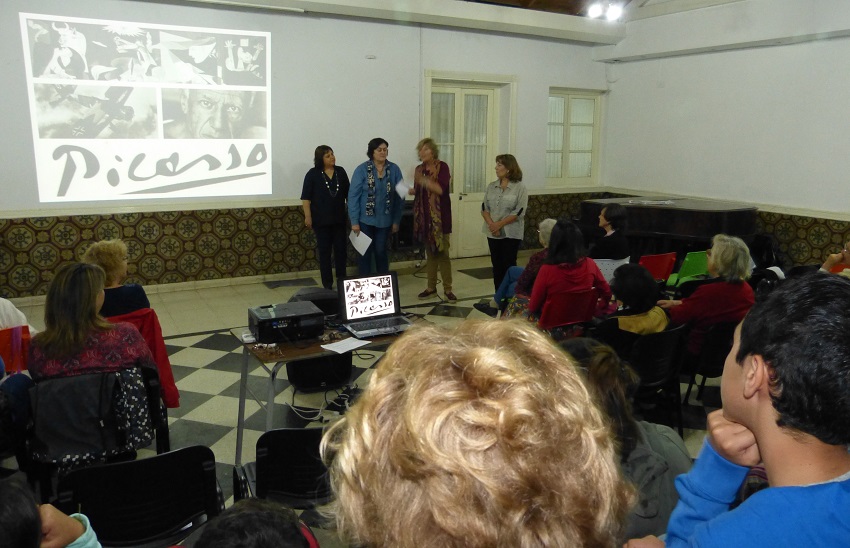San Miguel, Argentina. Invited by the Angel D’Elia High School the Askatasunaren Bidea Association held “Gernika Day of Inevitable Reflection about the Devastation and Human Atrocity and the Resignification through Art: Pablo Picasso.” The event, directed to teenagers and adults was taught by art professor, Silvia Elena Garay, Ana Maria Palavecino and history professor Mariana Fernandez Castelli. Mercedes Cremona, Literature professor, and director of the institute also participated with a reading of the text The Victory of Gernika, by Paul Eluard.
In hopes of “relating the artistic expressions with historical processes and logic that underlie them,” the day that was run like a creative workshop, allowed Garay, Palavecino and Fernandez Castelli to expose different historical settings that led to the attack of the city of Gernika and its impact on culture; propose the analysis of texts and artistic works and then reach the conclusions raised by participants in relation ot he artist Pablo Picasso; and work in groups using instructions provided, oriented to artistic production.
After the theoretical portion was over, divided into three disciplines – history, literature and art, those present work with the instructions given and created masks, sculptures, paintings and representations through dialogue, each one presented to the class with a phrase or brief reflection.
As the Askatasunaren Bidea member Mariana Fernandez Castelli told EuskalKultura.com, “The day ran as we had hoped and was greatly enriched by the contributions of the participants." "I want to stress the especially active participation on the part of the 1st year students (12-13 year olds) who put special emphasis on the importance of life, being a human bean and peace and related this theme to Gernika by using current conflicts taking place in the Middle East. In the same way, they showed great interest in the possibility of seeing the same event and issue from different aspects: historical, literary and artistic,” she said.
Fernandez Castelli stressed that “we want to emphasize that the testimony of Maria Jesus Andres, member of Askatasunaren Bidea, was followed with great attention as she spoke about the bombing, a story that she learned at home from her mother, Jesusa Zarandona, a witness of the bombing.” “This also allowed us to recognize the value of oral transmission. As a Basque group, the transfer of knowledge on an issue that is so deeply rooted in the memory of the Basque people, such as Gernika, was a challenge; however, the possibility of addressing it in the way we did facilitated the local community approach it,” she concluded.






 Send to a friend
Send to a friend Add comment
Add comment








